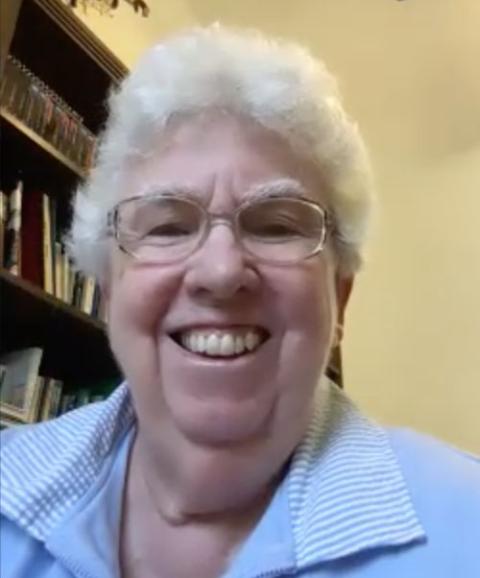
Children participate in a 2007 Earth Day celebration hosted by the Sisters of St. Joseph Earth Center in Philadelphia. (Courtesy of Mary Elizabeth Clark)
In Laudato Si', Pope Francis' 2015 encyclical on the environment, he writes that praying at mealtimes "reminds us of our dependence on God for life; it strengthens our feeling of gratitude for the gifts of creation; it acknowledges those who by their labours provide us with these goods; and it reaffirms our solidarity with those in greatest need."
"I ask all believers to return to this beautiful and meaningful custom," he writes.
In response to that call, Sr. Mary Elizabeth Clark has composed more than 30 mealtime prayers centering around care for our common home in an upcoming prayer booklet, From Pope to Pew.
A Sister of St. Joseph of Philadelphia, Clark serves as an ambassador for the U.S. Conference of Catholic Bishops' Catholic Climate Covenant. She also leads the Sisters of St. Joseph's Earth Center at Chestnut Hill College in Philadelphia, where she is special assistant to the president for sustainability.
Before focusing her ministry on sustainability, she served for nine years as her community's social justice coordinator; spent seven years as a lobbyist with Network, a Catholic social justice lobby in Washington, D.C., advocating for welfare reform; and taught for 18 years in parochial elementary schools in Pennsylvania and New Jersey.

St. Joseph Sr. Mary Elizabeth Clark speaks to Global Sisters Report in June. (GSR photo/Lucy Grindon)
This year, she will retire from her position as director of the Earth Center, which she has led for nine years.
GSR: What led you to your ministry in sustainability almost a decade ago, and how is it connected to your previous social justice work?
Clark: I came back from Network to start the Earth Center and to connect sustainability issues, Earth justice, with social justice.
Very definitely, the work of social justice and how we treat humans is extremely connected to Earth justice and how the poorest of the poor humans are damaged first and worst in the Earth catastrophe of climate change.
My work of social justice, I always felt, had to have the umbrella of environmental justice. I always had that feeling when I worked at Network — even though Network saw other groups like Greenpeace and different green groups taking care of that issue, we always had a sensitivity toward Earth issues, so I always saw it as one big whole. Pope Francis calls it "integral ecology," and by that, he means social justice and Earth justice are connected.
What were you primarily advocating for when you were working at Network?
I had domestic injustice, so that would be the labor issues, women and children, domestic legislation, advocating for at that time the TANF [Temporary Assistance for Needy Families], which was the renovation of welfare. That was my biggest piece of work. I created a national survey through the help of a Philadelphia sociologist from Drexel University, Doug Porpora, and his students. They volunteered to study the evidence, the data that we collected from across the country, to do the welfare reform.
How did that work inform what you do now with sustainability?
We asked our members from Network to interview people at soup kitchens, emergency clinics, homeless shelters and hospitals about how they were being treated and how they felt the social services were handling their situations. And in so many cases, the effects of climate change — the rising sea levels, the changing coastline, the temperature changes — came up.
The people that were most affected were especially in the Amazon, South America, Africa, Brazil, these places. We had interviews and brought people from those places to speak to Congress.
My favorite thing to do was to be accompanied by somebody who was actually experiencing the effects of poverty and climate change. I would have them come to a hearing and sit next to me. We had just the one seat, and I wanted them to do the talking, so I would introduce them in the chair and then they would take my place. I would keep sitting on the edge of the chair so that it was my seat, but I wanted them to be doing the talking.
I think that was very effective. I think the fact that we had direct contact with people who were poor and with the people affected by climate change was very significant in the shaping of the TANF bill.
Advertisement
Your targeted readers of From Pope to Pew are Catholic teachers, catechists, parents, mentors and instructors who do homeschooling. Why do you believe it's important to integrate the understanding many young people have about climate change with their faith from a young age?
As Pope Francis called us to saying grace, for instance, before meals, I wrote about 35 mealtime prayers so that families would make that connection of faith and their food. That's the difference between this document and the one I did called Teaching Kids to Care for God's Creation. I was thinking that if this could be published as an accordion laminated card that could be on people's dinner tables, that would be a clever way to display it.
One of your proposed mealtime questions for family discussion is: "How have you been able to make a spiritual practice of eating less meat?" Why is it important to think and to pray about caring for our common home in the context of our eating and our consumption?
The division between the haves and the have-nots is so vast, and the haves have the luxury of choosing whether or not to eat meat. When you know what it takes to use land for cattle to have meat, when you think about the land and how it's used for cattle instead of for simple farming, then it just feels so unjust to promote cattle grazing and cattle raising, and that's only one aspect of it.
Then there's the dairy and the pigs and the way they're treated in institutional farming practices. There's just a whole lot of unjust treatment of animals and the land for the sake of humans having this luxury of meat.
What's the mission of the Earth Center?
It's education, integration of Earth matters into all kinds of education — elementary school, secondary school, college level, adult parish level, parish staff level. All levels of education, I believe, ought to have integrated into them Earth justice and sustainability practices. I call it ecological conversion. It's turning away from consumerism and many of the stereotypical U.S. values toward sensitivity for Earth matters and sustainability.
What's your biggest hope for these new prayers, and what settings would you love to see them used in?
I would love to see them used in families, used in classrooms, used at faculty meetings, used by parish staff, used in college faculty lunchrooms, talked about over meals in religious ed settings, in parish settings of adult education, and in schools, certainly.






